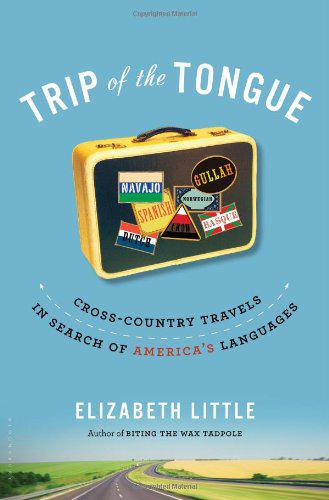TL;DR: Read it if you like Bill Bryson or history or languages.
Since I obviously have amazing opinions and taste, and since most people aren’t afforded easy access to them, I
figured I’d kick off a new feature on i-josh.com: reviews! This is where I consume some piece of pop culture - a book,
a movie, perhaps a video game, maybe some music - and then I tell you exactly what I think about it. C’mon, you know
how reviews work. The main difference between all other reviews and my reviews is that I’ll be accurate and honest! I’ll
also give you a “TL;DR:” at the top. If you’re not internet-abbreviation-savvy, that means “Too Long; Didn’t Read” and
indicates a very brief, often one sentence, summary. Or, you know, you could go academic and call it an “abstract”.

The first installment is about the book I recently read: Trip of the Tongue by Elizabeth Little. The story
follows the author around the United States, getting a feel for the languages - other than English - spoken there. Some
languages, such as Spanish in New Mexico or Hatian Creole in Miami, are fairly widely spoken and thriving; others, like
Crow in Montana or Norwegian in North Dakota, are dying as their speakers convert to using English.
As a bonus, since I listened to this as an audio book rather than actually read it, I’ll be reviewing the narrator - one
Ms. Annie Waters - as well!
Elizabeth Little (can I call you Liz?) mixes the history of the languages and the region together with her observations
of how it is in present days. While she can sometimes be slightly dry, for the most part she writes in a very approachable
voice. Though she’s certainly spouting a lot of history, she does a great job of looping it into a tale rather than just
throw facts and dates at you. This was written as a memoir, telling us what she learned from which experiences, instead
of just a discourse on what languages are succeeding and which are dying.
One of the things I really liked is the fact that she presents reasons why one language succeeds and another one doesn’t.
Sometimes, the reason is just a theory, but it’s clear that she has put some thought into it. I also found it
interesting, if not sometimes a little embarrassing on her behalf, to hear about how she went about trying to encounter
the languages. As an example, she mentions that, while in North Carolina researching Gullah, she only truly heard it
twice, once from a tour guide, and once from someone she essentially pestered into speaking it for her. I can just
imagine the desire to hear a real example of another language (and NOT just the tourist version!), but I can also
imagine how the other person must feel to be put on the spot to say… what, exactly?
Another thing I enjoyed about this audio book was the occasional juxtaposition between the narrator, Annie Waters, and
the content. The narrator sounded like a pleasant older lady, probably in her mid-sixties. She could almost have been
doing some knitting while narrating, taking occasional breaks to lovingly play with her grandchildren. Yet, when this
gentle lady says “It was hotter than Satan’s sweaty ballsack”, you can’t help but be jolted a little bit. You see, Liz
is a younger woman with a bolder (read: dirtier) way of stringing words together. Another example is when whe talks
about the “fuck me” factor when it comes to the beauty of landscapes: essentially, the more profanity, the more amazing
the scenery. She lets us know exactly what she thinks of north-western Washington! Hearing this come from Annie Waters
just makes the language that more jarring.
Aside from that, listening to Annie was okay. In places, she’s kinda disjointed, not really flowing through the
sentences. She also doesn’t do a great job with the tables in the text, but I’m sure that she did as well as can be
expected; I mean, what CAN you do reading a list with several words and their verb forms? But it was pleasant and
relaxing listening to her. Not one of those “I’d listen to them read the phone book” voices, but certainly not annoying!
She also gets kudos for at least trying to properly pronounce the few words in other languages. However, who am I to
know if she got them right?
Overall, this was an enjoyable listen. If you don’t like language or history, then don’t bother. Otherwise, you could do
a lot worse with 10 hours of music/audio book listening time!